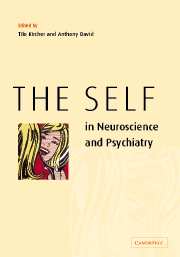Book contents
- Frontmatter
- Contents
- List of contributors
- Introduction: the self and neuroscience
- Part I Conceptual background
- Part II Cognitive and neurosciences
- 5 The multiplicity of consciousness and the emergence of the self
- 6 Asynchrony, implicational meaning and the experience of self in schizophrenia
- 7 Self-awareness, social intelligence and schizophrenia
- 8 The neural correlates of self-awareness and self-recognition
- 9 Autonoetic consciousness
- 10 The neural nature of the core SELF: implications for understanding schizophrenia
- Part III Disturbances of the self: the case of schizophrenia
- 11 Self and schizophrenia: a phenomenological perspective
- 12 Self-disturbance in schizophrenia: hyperreflexivity and diminished self-affection
- 13 The self-experience of schizophrenics
- 14 The paranoid self
- 15 Schizophrenia and the narrative self
- 16 Self-narrative in schizophrenia
- 17 Schizophrenia as disturbance of the self-construct
- 18 Action recognition in normal and schizophrenic subjects
- 19 Disorders of self-monitoring and the symptoms of schizophrenia
- 20 Hearing voices or hearing the self in disguise? Revealing the neural correlates of auditory hallucinations in schizophrenia
- 21 The cognitive neuroscience of agency in schizophrenia
- 22 Self-consciousness: an integrative approach from philosophy, psychopathology and the neurosciences
- References
15 - Schizophrenia and the narrative self
from Part III - Disturbances of the self: the case of schizophrenia
Published online by Cambridge University Press: 18 December 2009
- Frontmatter
- Contents
- List of contributors
- Introduction: the self and neuroscience
- Part I Conceptual background
- Part II Cognitive and neurosciences
- 5 The multiplicity of consciousness and the emergence of the self
- 6 Asynchrony, implicational meaning and the experience of self in schizophrenia
- 7 Self-awareness, social intelligence and schizophrenia
- 8 The neural correlates of self-awareness and self-recognition
- 9 Autonoetic consciousness
- 10 The neural nature of the core SELF: implications for understanding schizophrenia
- Part III Disturbances of the self: the case of schizophrenia
- 11 Self and schizophrenia: a phenomenological perspective
- 12 Self-disturbance in schizophrenia: hyperreflexivity and diminished self-affection
- 13 The self-experience of schizophrenics
- 14 The paranoid self
- 15 Schizophrenia and the narrative self
- 16 Self-narrative in schizophrenia
- 17 Schizophrenia as disturbance of the self-construct
- 18 Action recognition in normal and schizophrenic subjects
- 19 Disorders of self-monitoring and the symptoms of schizophrenia
- 20 Hearing voices or hearing the self in disguise? Revealing the neural correlates of auditory hallucinations in schizophrenia
- 21 The cognitive neuroscience of agency in schizophrenia
- 22 Self-consciousness: an integrative approach from philosophy, psychopathology and the neurosciences
- References
Summary
Abstract
In this study of schizophrenia and narrative identity, the author begins with a description of narrative identity and a discussion of the debate over narrative identity: a debate that pits theorists arguing that narrative structures are embedded in lived life against those claiming that self-narratives are fictive structures that bear no relation to life as actually lived. The author defends a centrist position that finds narrative identity in part emerging from the life of the individual and in part constructed by the individual. Against the background of this discussion he then presents the histories of three schizophrenic patients. The first is an example of a highly fragmented self-narrative. The second is a delusional self-narrative. Finally, the third history is that of a woman struggling over whether to think of herself in terms of a schizophrenic ‘illness’ narrative.
Introduction
In addressing the narrative self in schizophrenia, I will begin with the broader topic of the self as such. Contemporary discussions of the self divide into positions that view the self as an essence or substance and those that view it as a construct. The notion of self as essence or substance implies that there is something like a human nature that dictates the course of self-development through the life span. Philosophically, Aristotle is the central figure at the origin of this point of view; he argued that man has a ‘form’ which he realizes over the course of a life.
- Type
- Chapter
- Information
- The Self in Neuroscience and Psychiatry , pp. 319 - 335Publisher: Cambridge University PressPrint publication year: 2003
References
- 11
- Cited by



